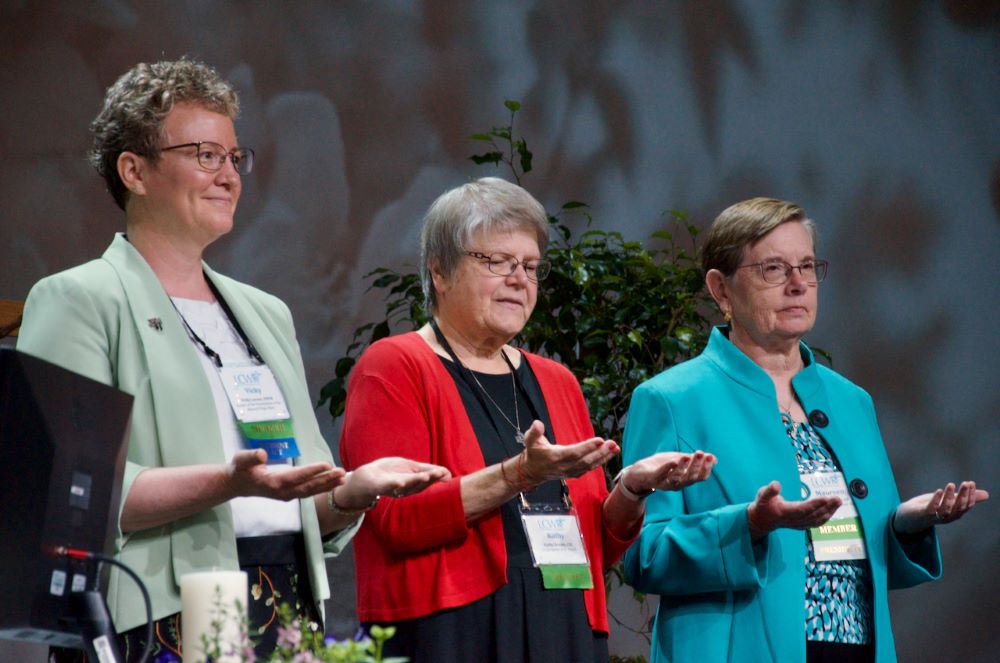
Presentation Sr. Vicky Larson (left) receives a leadership blessing as she becomes president-elect of the Leadership Conference of Women Religious Aug. 16 at its annual assembly in Orlando. (Dan Stockman)
Sr. Vicky Larson had no desire to join her congregation's leadership team, and the first time she was asked, in 2014, she said no.
She had enjoyed her career in nursing and then as a nursing professor, but the Presentation Sisters of South Dakota asks all its members to at least be open to the idea of leadership. So when an opportunity came in 2018 to continue teaching and serve part time on the leadership team, she gave it a try.
"I loved it," Larson said. "I really enjoyed it."
By 2020 she was on the national board of the Leadership Conference of Women Religious, and in June 2024, she was elected to the three-person presidency of the conference, which represents about two-thirds of the nearly 36,000 sisters in the United States.
She was installed as LCWR president-elect in August; next August at the group's annual assembly Larson will become president.
GSR: You join the LCWR presidency at a time when many congregations are seeing dramatic change as their numbers get smaller.
Larson: I came into the community with my eyes wide open — everyone was at least 10 years older than me, and I knew there were going to be a lot more funerals than professions.
Some people ask how do you live with all these funerals, and I say, how do you live without these incredible women as part of your lives? And there's also the communion of saints — they don't just go away after they die. I feel it's a real grace and gift being part of religious life now.
Most sisters remember the upheaval of Vatican II, but you were born almost a decade later, so a renewed religious life is all you've ever known.
I also grew up in public school and didn't know any sisters until college, and my formation was all intercongregational. I wasn't the first in my community to have a collaborative novitiate, but I was close, and for the older sisters, it's mind-boggling to do your novitiate with other congregations' sisters. Being intercongregational is just a part of the way religious life has been for me.
When people talk about religious life as a whole, that sense that we're in it together, that feels very comfortable for me.
Despite those differences, you also have a lot of experiences in common with sisters across the country.
Our motherhouse was built in Aberdeen (South Dakota) 70 years ago to house 100 nuns and a college. But today there are only 38 sisters in the community, so you had 20 sisters claptrapping around in this huge building.
The college closed in 2023, and we had moved out in early 2021, and while it's a huge change for our community not to have the motherhouse to go back to, we're also apostolic so most of us have spent our lives not living in the motherhouse.
Aberdeen is a small town of about 25,000 people, while Sioux Falls (about three hours southeast) is a growing city of around 200,000, so there are a lot more options for retired sisters to volunteer in Sioux Falls than in Aberdeen, so a lot of sisters choose to age in place there.
That concept of a motherhouse isn't our reality anymore.
Buildings are just buildings — tools to enable ministry — but there is an emotional side, as well, and letting go is not always easy.
The hard part for us is letting go of the chapel. Some of the sisters even remember the old chapel at the hospital in town before we moved out to the prairie. The community had perpetual adoration there for over 100 years.
But we're also seeing the campus evolve — we're working on getting the original prairie grass restored. Not only do the native plants hold the soil better and resist drought, their huge root systems sequester carbon.
Advertisement
The first time you were nominated for leadership, you said no. Now you're in the LCWR presidency. How did that happen?
I sure didn't join the community thinking about the leadership team. But I had been part-time teaching and part-time on the leadership team, and after 19 years of teaching, last December I had a little nudge. So I put in my resignation from teaching in January, not really sure where it all would lead.
Then I got nominated for the LCWR presidency and talked to the team about it. They said it seemed like good timing, so I left my name in.
Where do you see religious life heading in the next few years?
We built a lot of institutions and now we're able to hand those off to other people to take it and run with it. So while we've always been in community, we're really able to get to know each other better.
Jesus had a love experience when he was on Earth, and I think as we get smaller, we're called into that deeply. It's not easy when our identities are caught up in the things we do. They're amazing things, but I think it's about who we are, not what we do.
There's deeper work to do in learning to be what Jesus wanted us to be. Call it light, call it love, but I don't think we have to have big, huge numbers to be leaven. I think there's tremendous things we're called to do that we don't even realize now.





